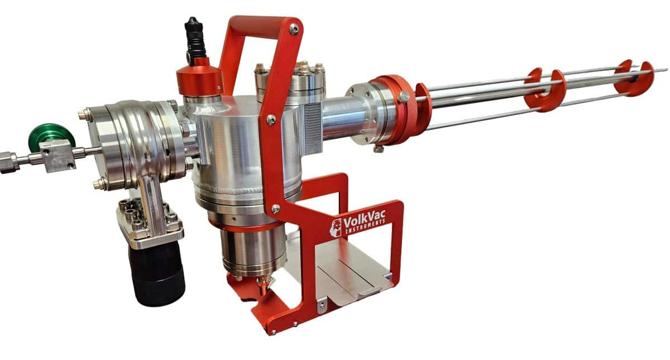Physicsworld
1M
228

Image Credit: Physicsworld
VolkVac Instruments uses Atlas Technologies’ bi-metal expertise to create lightweight UHV suitcases
- VolkVac Instruments has integrated bi-metal flanges supplied by Atlas Technologies into its latest ultrahigh-vacuum (UHV) suitcase to transport samples between systems across great distances without contamination. The suitcase is important, as raising a UHV sample's temperature changes its material behaviours permanently, and opening a UHV chamber can require several days of bakeout. Aluminium is an ideal material as it is lightweight and easy to machine. Although aluminium conducts heat ten times better than stainless steel and introduces smaller amounts of contamination, it is softer than steel and cannot be machined as efficiently. Bi-metal expertise is required to resolve aluminium's softness.
- US-based VolkVac Instruments has created its ultralight aluminium ULSC-R UHV suitcase that weighs less than 7 kg. Its main challenge was controlling the softness of aluminium that could wear away sharp edges in UHV conflat flanges quickly, so engineering firm Atlas Technologies was deployed to create bimetal flanges with titanium, eliminating the need for stainless steel. The two companies worked closely to create VolkVac's custom iteration of the ULSC suitcase.
- VolkVac is entrepreneur Igor Pinchuk's brainchild. While creating bespoke UHV solutions for decades, a portable UHV chamber requires uninterrupted UHV operation using integrated pumps. While Atlas removed the need for stainless steel materials through its bi-metal flanges, the handling system uses lightweight non-magnetic materials that can contain samples without altering composition.
- UHV suitcases are essential for laboratory research studies that use ultra-high vacuum systems. Moving samples from one UHV system to another can be a complex and contaminated process if traditional methods are applied. The latest advances in materials, vacuum pumps, pump controllers, and batteries have made it possible to develop a lightweight, portable UHV chamber capable of maintaining its true UHV administration.
- UHV and XHV tech plays an important role in particle accelerators, physics, chemistry, and materials science research. With UHV and XHV vacuums operating in the mere absence of air, beams of charged particles are free of collision with gas molecules that could contaminate samples. Studies involving the creation of advanced semiconductors can only be done in the absence of air.
- Atlas Technologies specializes in creating aluminum vacuum chambers with bi-metal flanges, and although bonding aluminum to stainless steel has been the norm, explosive welding can also bond aluminum and titanium, which avoids the poor UHV properties of stainless steel
- Aluminum, which is over ten million times less susceptible to contain hydrogen than stainless steel, also contains much less gas from the atmosphere when opened. Aluminum vacuum chambers retain most gains from bakeouts, making them ideal for industrial processes requiring constant vacuum. Aluminum also has excellent thermal conductivity qualities, slow magnetic permeability, and less resistance to corrosion than stainless steel
- In summary, the UHV suitcase integrated with bi-metal flange expertise from Atlas Technologies aims to eliminate contamination when transporting samples from one UHV system to another. The aluminum material makes it lightweight, and with the development of bi-metal flanges, it has eradicated the need for using stainless steel. VolkVac Instruments has developed and used these UHV suitcases to address this particular problem, making the transportation of samples safer and relatively comfortable.
- The post VolkVac Instruments uses Atlas Technologies’ bi-metal expertise to create lightweight UHV suitcases appeared first on Physics World.
Read Full Article
13 Likes
For uninterrupted reading, download the app